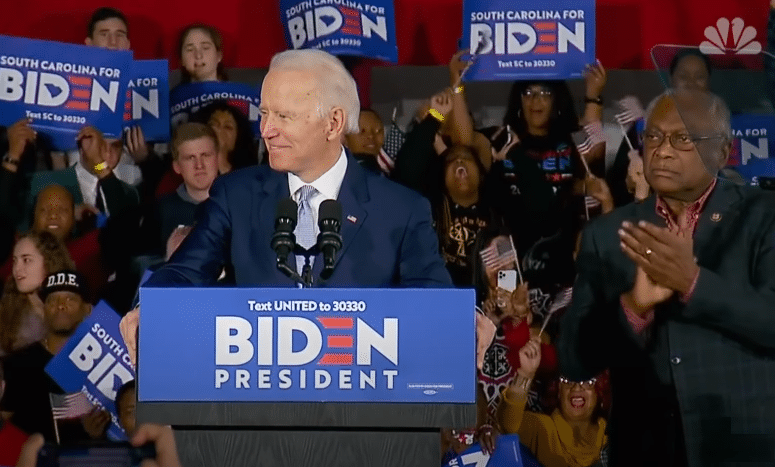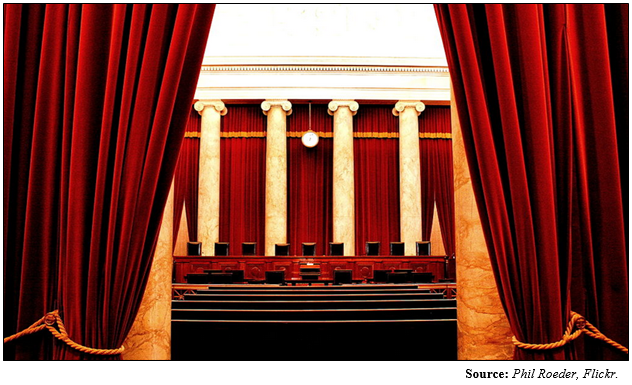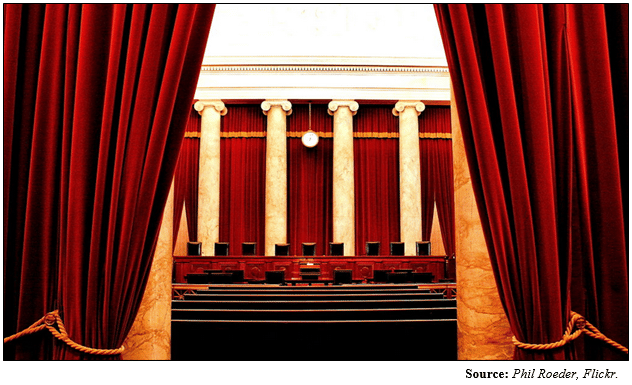March 20, 2024
Permission to republish original opeds and cartoons granted.
A Huge Double-Digit Decline in the Share of Black Voters Saying Biden’s Policies Have Helped Them Could Shake Up 2024 Election

By Manzanita Miller
After supporting Democrats for decades, Black Americans are poised to make a marked shift away from the left thanks to the Biden Administration’s dismal economic record and abandonment of the working-class.
A striking New York Times/Siena College poll from early March shows the share of Black Americans who say President Joe Biden’s policies have “helped them personally” has taken a forty-one-point nosedive since last November’s Times/Siena battleground state poll.
Currently, just 21% of Black Americans say Biden’s policies have “personally helped them”, while three times as many – 62% – said Biden’s policies had personally helped them last November.
The poll also shows former President Donald Trump may be on the precipice of earning around a fifth of the Black vote this November, with 20% of Black voters saying they would support Trump over Biden – an eight-point increase compared to 2020 exit polls.
Economic issues, as well as recent foreign policy disputes, are at the core of Biden’s shrinking support among Black voters, and there is little evidence this trend is reversing.
Black voters have a highly negative view of the Biden economy, saying by a wide thirty-eight-point margin – 69% to 31% – that the economy is in fair or poor condition.
Looking back at the economy four years ago to the spring of 2020, Black voters say the economy was better back then by a thirty-two-point margin, 52% to 20%. Consider this – spring 2020 was in the midst of the coronavirus pandemic, at a time when millions of Americans were banned from their places of work and under forced lockdown. Yet voters still say by double digits the economy was better back then.
Biden’s stance on Israel has also been a sore spot for minorities, including Black Muslims. The Times poll reveals that a slightly larger share of Black voters sympathize with Palestine (30%) over Israel (27%). Whites and Latinos sympathize with Israel to a greater degree.
The “Abandon Biden” movement sweeping a string of Democratic swing-state primaries this spring is evidence of a growing share of ethnic and religious minorities withholding their support from Biden – and the movement is on the rise.
With economic issues and Biden’s foreign policy positions making him an increasingly unpalatable candidate to Black Americans, it is entirely possible that the 2024 election will result in a marked shift away from Democrats.
A recent Gen Forward poll shows 17% of Black voters intend to vote for Trump in November, and another 20% plan to vote for someone other than Trump or Biden, despite close to 90% supporting Biden in 2020.
Since Trump’s victory in 2016, the Black vote for Republicans has been rising fairly rapidly. After Black voters largely consolidated around Barack Obama in 2008 and again in 2012, Trump picked up additional Black voters in 2016 and again in 2020.
Trump earned 8% of the Black vote in 2016 – the largest share for a Republican presidential candidate since 2000 – and won 12% of their vote in 2020. Now Trump is within shouting distance of earning a full fifth of the Black vote according to recent polls.
Black voters are becoming less Democratic over time, and while a growing proportion are identifying as independent, Republicans are adding to their numbers at the margins. In the 2022 midterms, Republicans earned 13% of the Black vote compared to just 9% in 2018.
Democrats abandoning the middle-class has had huge ramifications on their ability to court working class whites, but the same self-serving policies have driven Black voters towards the right.
Americans for Limited Government Foundation’s 2018 nationwide survey of Black Americans found that while a majority are wary of the Republican Party label, many hold traditionally conservative views. We found four-in-five Black Americans (80%) believe that small business is the key to American success and the same number do not trust the government to spend tax dollars. There was near universal agreement (93%) on reducing individual tax rates and over half of black voters (53%) said the Democratic Party had left the black community behind while counting on their support.
Biden’s policies may have caused an irreparable rift with Black voters, and we are seeing a real-time revolt against the party in power among Black voters. Whether Black voters desert Biden for the Republican ticket at the margins or simply withhold their support in a protest-vote is yet to be seen, but the numbers are bleak for Biden.
Manzanita Miller is an associate analyst at Americans for Limited Government Foundation.
Did social media companies become transformed into state actors with the DHS, FBI censorship?

By Robert Romano
The Supreme Court on March 18 heard oral arguments on the Murthy v. Missouri (originally Missouri v. Biden) case about federal government agencies including the Department of Health and Human Services, the Department of Homeland Security, the FBI and others coordinating with social media companies to remove content by users in opposition to Covid pandemic restrictions, opposing vaccine mandates, opposing mail-in ballots, supporting legal challenges of the 2020 elections, and so forth.
One of the questions in the case, according to ScotusBlog is: “whether the government’s challenged conduct transformed private social media companies’ content-moderation decisions into state action and violated respondents’ First Amendment rights...”
There are also questions about whether the case was originally brought with sufficient standing to begin with and also whether a preliminary injunction by the U.S. District Court for the Western District of Louisiana, issued July 4, 2023 issued nationwide was proper. These questions were briefly touched on, but most of the justices’ questions of the attorneys had to do with whether the government partnering with social media to moderate content turned the social media companies into state actors.
Given the amount of time spent on the merits, it did not sound as if the justices felt standing had not been sufficiently met.
Another question that came up repeatedly of whether coercion was necessary to overturn the government’s conduct, or if significant state encouragement would do.
Some of the justices, like Brett Kavanaugh, noted examples where government officials would interact with news reporters demanding corrections to facts in a news story.
The respondents’ attorney responded that in this case, the parties’ whose speech was being censored on social media never had an opportunity to correct the record, since the discussions that occurred were between government officials and the social media companies themselves.
At one point Justice Amy Coney Barrett noted that there are cases where coercion isn’t needed in cases of “joint” action, stating, “there are some times when things veer into the joint action space where we would say that maybe there was state action.” This could indeed be one of those cases.
The Cybersecurity and Infrastructure Security Agency (CISA) admitted according to the agency’s website that it “rout[es] disinformation concerns” to “appropriate social media platforms”: “The [Mis, Dis, Malinformation] MDM team serves as a switchboard for routing disinformation concerns to appropriate social media platforms and law enforcement.”
This has been going on since 2018: “This activity began in 2018, supporting state and local election officials to mitigate disinformation about the time, place, and manner of voting.” And it was expanded in 2020: “For the 2020 election, CISA expanded the breadth of reporting to include other state and local officials and more social media platforms.”
The agency was bragging about its “rapport” with Big Tech firms in censoring speech so they’re on the same page: “This activity leverages the rapport the MDM team has with the social media platforms to enable shared situational awareness.”
During the pandemic, CISA also targeted Covid “disinformation” too: “COVID-19…create[d] opportunities for adversaries to act maliciously. The MDM team supports…private sector partners’ COVID-19 response…via regular reporting and analysis of key pandemic-related MDM trends.”
Throughout, the government was describing itself as “partnering” with the private sector, something that Justice Samuel Alito was keen to hone in on, stating, “We're partners, we're on the same team. Do you think that the print media regards themselves as being on the same team as the federal government, partners with the federal government?”
At a certain point, Justice Kavanaugh agreed, stating, “on the partners point, though, that does strike me as unusual…”
Justice Barrett wanted an answer to that, too, where if the social media companies were volunteering to turn over content moderation to the government, wouldn’t that be state action: “what if Facebook said, you know what, we're partners, we're on the same team, this is a once-in-a-lifetime pandemic, and we think it would be most efficient and most helpful for the public good for us to just turn over our content moderation to you? That's not coercion. That's voluntary on Facebook's part, but wouldn't it be state action then?”
There was also a question of whether the social media companies occasionally refusing to remove content, whether that was relevant to the inquiry, with Justice Kavanaugh asking the respondents’ attorney, “What do you do with the fact that the platforms say no all the time to the government?”
J. Benjamin Aguinaga, Solicitor General of Louisiana, the respondents’ attorney replied, “Your Honor, it doesn't matter. I think Judge Posner made this -- this point in Backpage versus part, which is you could have a threatener who threatens the recipient, the recipient says no, and so the threatener packs their tent and walks away. That's still a First Amendment violation even though the recipient refused to comply.”
All Justice Kavanaugh said in reply was “Thank you."
At one point Justice Ketanji Brown Jackson asked a hypothetical question about kids jumping out of windows on social media, whether the government could go to the social media.
Justice Barrett asked about getting doxed on social media and an angry mob showing up at the government officials' homes, an obvious allusion to protesters using social media to organize in front of Justices’ homes, indicating justices are very sensitive about some of the harms that can occur with instances that might pose an imminent harm to life and limb.
Other hypothetical questions posed by justices included the government asking a publisher not to put out a story about an imminent military action or preventing lawless action like a terrorist attack.
Aguinaga was able to push back and say that's not the kind of speech we're talking about. The case poses not questions of imminent lawless action or publication of troop positions in the field but questions of entire viewpoints based on content — "I oppose vaccines” — being suppressed.
And this may be what makes the case more difficult to decide: There’s so many different examples of censorship. Thousands.
Usually a First Amendment case is, the government took down my billboard or I wanted to have a rally and the government said no. This case has thousands of different examples, some of which might be include legitimate government speech, for example, correcting the record without including requests for content removal, and others where it wasn't and crossed the line into state action to censor content. A twist is many of the victims were only discovered when the court compelled discovery from the states' original case against the Biden administration. That is, one of the reasons the breadth of the censorship was found out was only because it was challenged.
And because the case involves so many different examples, it might be difficult to render a broad ruling. Imagine the Supreme Court attempting to hear a case about 10,000 different search warrants, all with different details. It would never hear such a case. It might hear a few of them that pose substantive Fourth Amendment issues.
Which might be why it would be easier to just uphold the Brandenburg v. Ohio Supreme Court decision of 1969 which found the only kind of speech that the government can intrude upon is that which would result in “imminent lawless action”: “the constitutional guarantees of free speech and free press do not permit a State to forbid or proscribe advocacy of the use of force or of law violation except where such advocacy is directed to inciting or producing imminent lawless action and is likely to incite or produce such action.”
That is, if respondents’ whose speech was suppressed were not advocating law-breaking or advocating violence in a manner that was “likely to incite”, etc., the government had no business urging its removal. Bear in mind, that was a case of white supremacists who in demonstrations were in fact advocating the overthrow of the government, however, as there was no actual attempt to do so, was protected political speech.
The fact is, entire bodies of content-based restrictions were utilized as a more efficient means of censorship, not because they were violating any laws, but because they were opposing government mandates to take vaccines and government policies that allowed mail-in ballots that citizens’ thought was rife for fraud, etc. These citizens weren’t advocating law-breaking or violence, they were dissenting, and the government wanted it stopped.
Robert Romano is the Vice President of Public Policy at Americans for Limited Government Foundation.
To view online: https://dailytorch.com/2024/03/did-social-media-companies-become-transformed-into-state-actors-with-the-dhs-fbi-censorship/

